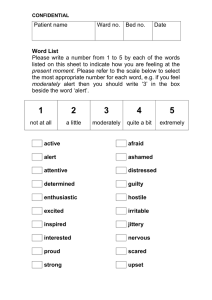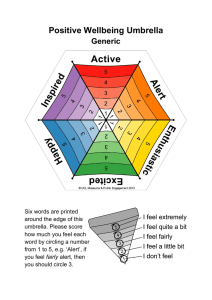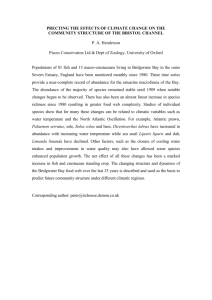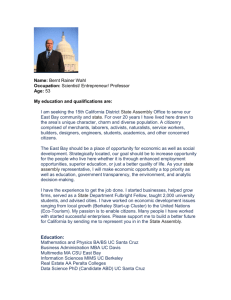A Comparative Assessment of the Capacity of Canadian Rural Communities... Uncertain Futures PROJECT TITLE
advertisement
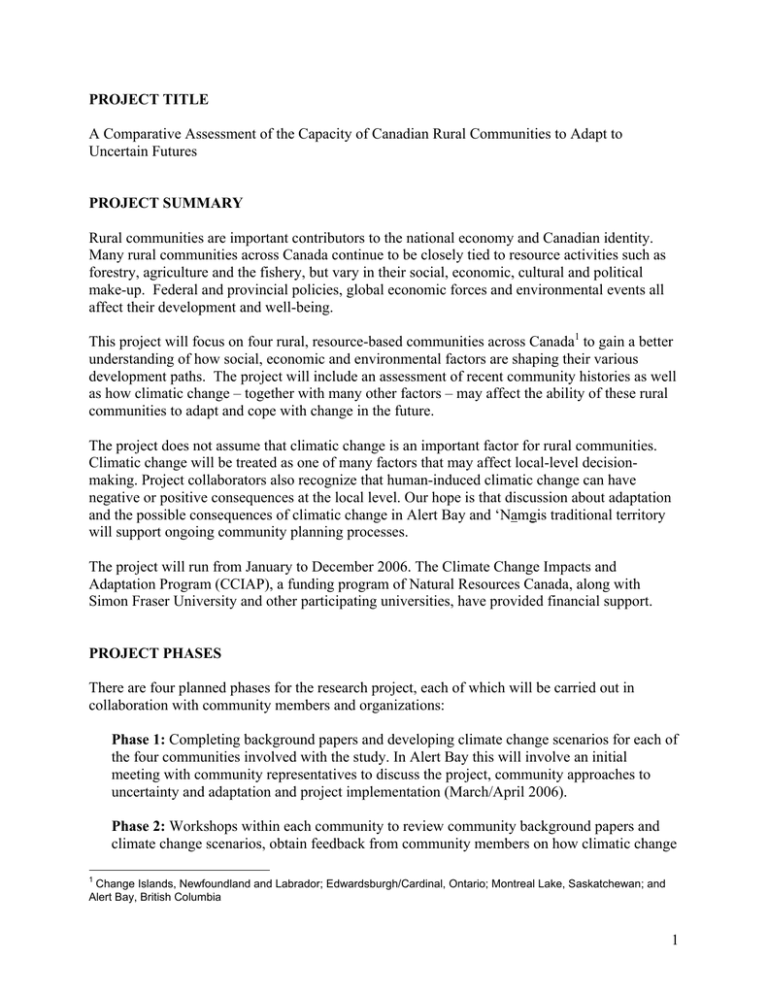
PROJECT TITLE A Comparative Assessment of the Capacity of Canadian Rural Communities to Adapt to Uncertain Futures PROJECT SUMMARY Rural communities are important contributors to the national economy and Canadian identity. Many rural communities across Canada continue to be closely tied to resource activities such as forestry, agriculture and the fishery, but vary in their social, economic, cultural and political make-up. Federal and provincial policies, global economic forces and environmental events all affect their development and well-being. This project will focus on four rural, resource-based communities across Canada1 to gain a better understanding of how social, economic and environmental factors are shaping their various development paths. The project will include an assessment of recent community histories as well as how climatic change – together with many other factors – may affect the ability of these rural communities to adapt and cope with change in the future. The project does not assume that climatic change is an important factor for rural communities. Climatic change will be treated as one of many factors that may affect local-level decisionmaking. Project collaborators also recognize that human-induced climatic change can have negative or positive consequences at the local level. Our hope is that discussion about adaptation and the possible consequences of climatic change in Alert Bay and ‘Namgis traditional territory will support ongoing community planning processes. The project will run from January to December 2006. The Climate Change Impacts and Adaptation Program (CCIAP), a funding program of Natural Resources Canada, along with Simon Fraser University and other participating universities, have provided financial support. PROJECT PHASES There are four planned phases for the research project, each of which will be carried out in collaboration with community members and organizations: Phase 1: Completing background papers and developing climate change scenarios for each of the four communities involved with the study. In Alert Bay this will involve an initial meeting with community representatives to discuss the project, community approaches to uncertainty and adaptation and project implementation (March/April 2006). Phase 2: Workshops within each community to review community background papers and climate change scenarios, obtain feedback from community members on how climatic change 1 Change Islands, Newfoundland and Labrador; Edwardsburgh/Cardinal, Ontario; Montreal Lake, Saskatchewan; and Alert Bay, British Columbia 1 may affect development and livelihood opportunities and discuss adaptation strategies. The workshops are a central component to the research and will allow for local collaborators to discuss and analyze past, present and future opportunities and limitations for their communities. In Alert Bay the workshop will be held Oct. 3rd and involve both a full-day workshop and evening public session (May-Oct. 2006). Phase 3: Production of documents for each of the communities, integrating the information from background documents and discussion at the workshops. Community participants will have a chance to review the reports and make sure that their concerns and ideas have been clearly understood and accurately represented (October/November 2006). Phase 4: Preparation of a final report comparing the four communities by examining similarities and differences in their development priorities and abilities to adapt to changes, in climate and more generally, by resource sector and region (November/December 2006). Project updates will be made available to community partners and workshop participants in the summer/fall of 2006 (between Phases 1 and 2) and upon completion of all four community workshops to ensure ongoing communication throughout the project. PROJECT PARTNERS AND CONTACTS University Collaborators • Carleton University, Ottawa, Ontario o Mike Brklacich (mbrklac@ccs.carleton.ca) o Emily Wilson (mlekwilson@yahoo.ca o Maureen Woodrow (mwoodrow@ccs.carleton.ca) • University of Saskatchewan, Saskatoon, Saskatchewan o Maureen Reed (m.reed@usask.ca) o Mathieu Lebel (mathieulebel@hotmail.com) • Simon Fraser University, Vancouver, British Columbia o Patricia Gallaugher (pgallaug@sfu.ca) o John T. Pierce (pierce@sfu.ca) o Kelly Vodden (kmvodden@sfu.ca) Community Collaborators • • • • ‘Namgis First Nation, Village of Alert Bay, U’mista Cultural Centre and Inner Coast Natural Resource Centre, Alert Bay, B.C. Montreal Lake Cree Nation, Saskatchewan Municipal Council, Town of Change Islands, Newfoundland South Nation Conservation Authority, Berwick, Ontario 2 Government Collaborators • • Environment Canada, Impacts and Adaptation Research Group Natural Resources Canada, Climate Change Impacts and Adaptation Program (CCIAP) WHAT ROLE WILL INVITED PARTICIPANTS PLAY IN THE PROJECT? Approximately 30 community members representing First Nations and municipal governments, elders and the business community have been asked to join us at the full-day workshop described in Phase 2 above (to be held Oct. 3rd in Alert Bay). Invited local participants will be provided with a community background study and climate change literature review summary. At the workshop, highlights from these reports will be verbally summarized and local collaborators will be asked to discuss these documents and the historical, current and future developments of Alert Bay and surrounding area. Two possible future scenarios relating to climatic change will also be presented, followed by a discussion of how each of these may affect the community’s development and well-being. The workshop will include discussion of questions such as: • • • • What major changes have happened in Alert Bay and surrounding territory over the last 100 years? 20-25 years? Why have these changes taken place? How do you think your community will look 25-50 years from now? What forces will impact this future? Do you think that the climate has changed in the region over the past 100 years? 25-50 years? If so, how? What aspects of Alert Bay and ’Namgis First Nation’s future development plans are/are not sensitive to future changes in climate? After the workshop a report will be prepared. Participants will be invited to review the report and provide feedback on the workshop findings. Your participation in the workshop and report review will ensure that local priorities and perspectives are accurately represented. Each invited workshop participant will be offered a $100.00 per diem/participation fee for their contribution to the project. Employers may sponsor invited staff members to attend or claim the $100 fee toward wages of attending staff members. WHAT ROLE CAN MEMBERS OF THE COMMUNITY AT LARGE PLAY IN THE PROJECT? Members of the general public are welcome to attend both the full-day workshop as observers and the evening public session. The evening session will include presentations by invited guest speaker Hanna Eklund of Snowchange Cooperative, Finland and by local youth. The session is also an opportunity for open discussion and community input. 3 WHAT ARE THE BENEFITS OF PARTICIPATION IN THE PROJECT? Benefits of participating in this project include an increased awareness of climate change and its possible implications for future planning and local development. The project also provides an opportunity for dialogue with a diverse set of individuals who are all interested in a healthy and sustainable future for Alert Bay and surrounding territory. Finally, since background studies, workshop reports and the final comparative assessment report will all be sent to Natural Resources Canada and made widely available online, your participation allows for local voices and priorities to be heard in the national arena. WHO CAN I CONTACT FOR FURTHER INFORMATION? If you have any questions or are interested in participating in this project you may contact any of the following: 1. Kelly Vodden, Community Researcher, Simon Fraser University Telephone: 709-678-2147 Email: kmvodden@sfu.ca 2. Members of the Alert Bay Project/Workshop Steering Committee: Doug Aberley, George Speck, Marty Weinstein and Mona Madill, ‘Namgis First Nation (974-5556), John Rowell, Mike Berry and Bob Godwin, Village of Alert Bay (974-5213) and Andrea Sanborn, U’mista Cultural Centre (974-5403) 3. Maureen Woodrow, Project Manager, Carleton University: Telephone: 613 520-2600 Ext. 7553 or 233-9179 Email: mwoodrow@ccs.carleton.ca 4
